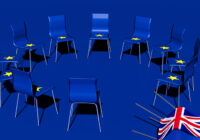George Soros, the man who “broke the Bank of England,” has a reputation for breaking and toppling.
In some sense the two big events of 2016 — the UK’s Brexit vote and the election of Donald Trump — have put the idea of meddling at the center of everyone’s news cycle, with Russia as the lead actor. Ever since their defeat in the November 2016 election, the Democrats in the US have sought to establish that the only reason they lost was due to Russian meddling. In the UK, the Electoral Commission has been investigating reports of Russian influence on the Brexit vote, in the form of paid advertising. They have identified Facebook, Twitter and Google as possible accomplices.
With the complex drama around negotiating the terms of Brexit still going on, the shocking news broke that George Soros had contributed funds to overturning Brexit. The Daily Telegraph offered this headline: “George Soros, the man who ‘broke the Bank of England’, backing secret plot to thwart Brexit.” Tory Brexit backer Nadine Dorries called it “tainted money provided by a man who wants to topple Theresa May.” The Sun reported it in these terms: “Furious Brexit backers rounded on the investor who ‘broke the Bank of England’ after his aides owned up to funding a number of anti-Brexit groups in the hope of securing a second EU Referendum.”
In the UK, Soros has a reputation for breaking and toppling. But The Mail on Sunday gave Soros the opportunity to explain the reasoning behind his decision and its legality, while The Guardian emphasized Soros’ commitment to democracy through the Open Society Foundation.
Here is today’s 3D definition:
Meddling:
Intervening from a global geopolitical viewpoint in a nation’s troubled, uncertain, hesitating quest for a local identity
Contextual note
The Brexit drama reflects and, in many ways, represents the major fault line in today’s political culture. It runs precariously between national identity and global activity. Businesses know no boundaries or, even when they exist, have found ways of neutralizing their effects. But nations are defined by boundaries. At the same time nations — and, more particularly, the political class — depend on the activity of businesses, and businesses, in turn, on global finance.
Add to that the fact that some nations have a more centralized approach to managing the business interests at the heart of their economy — Russia and China, for example, though in contrasting ways. The political-business configuration varies from nation to nation and culture to culture, but each configuration defines the kind of oligarchy that the current economy requires, where money is free to move but people are locked into a nation.
In psychological terms, the populations of nations — especially in Western democracies — have become “troubled, uncertain and hesitating” in their very identity. They don’t know which way to turn. Dominant political entities — powerful nations or regions, such as Europe — seek by all possible means to maintain their dominance both internally and externally. That means that, by definition, they are committed to meddling, at least to the extent they can get away with it. The US does it. Russia and China do it. Europe and India do it, but with more diffused means. Part of the game has been to call out the adversaries when it becomes apparent they are doing it. In a certain sense, that is even what’s behind Brexit: British interests calling out Europe for meddling, even though Britain was an integral part of Europe.
Historical note
Soros represents a different trend that can be called global, financial democracy. It sees populations as actors in the economy — producers and consumers — and strives to diminish the effect of local political control. But rather than being opposed to nations, Soros places himself above and beyond national politics and national economies, on a more universal plane, as he proved when he successfully bet against the pound in 1992 and “broke the Bank of England.” Paradoxically, he represents the quintessential vocation of Britain’s historical economic culture: international and focused more on finance and control of assets than on economic production. It’s the heritage of an empire on which the sun never set.
So, the Brexiteers are momentarily up in arms, but Soros is not Russia. Whether he succeeds or not in getting the British people to overturn Brexit, his meddling will be forgiven.
*[In the age of Oscar Wilde and Mark Twain, another American wit, the journalist Ambrose Bierce, produced a series of satirical definitions of commonly used terms, throwing light on their hidden meanings in real discourse. Bierce eventually collected and published them as a book, The Devil’s Dictionary, in 1911. We have shamelessly appropriated his title in the interest of continuing his wholesome pedagogical effort to enlighten generations of readers of the news.]
The views expressed in this article are the author’s own and do not necessarily reflect Fair Observer’s editorial policy.
Photo Credit: Adrin Shamsudin / Shutterstock.com
Support Fair Observer
We rely on your support for our independence, diversity and quality.
For more than 10 years, Fair Observer has been free, fair and independent. No billionaire owns us, no advertisers control us. We are a reader-supported nonprofit. Unlike many other publications, we keep our content free for readers regardless of where they live or whether they can afford to pay. We have no paywalls and no ads.
In the post-truth era of fake news, echo chambers and filter bubbles, we publish a plurality of perspectives from around the world. Anyone can publish with us, but everyone goes through a rigorous editorial process. So, you get fact-checked, well-reasoned content instead of noise.
We publish 2,500+ voices from 90+ countries. We also conduct education and training programs
on subjects ranging from digital media and journalism to writing and critical thinking. This
doesn’t come cheap. Servers, editors, trainers and web developers cost
money.
Please consider supporting us on a regular basis as a recurring donor or a
sustaining member.
Will you support FO’s journalism?
We rely on your support for our independence, diversity and quality.






